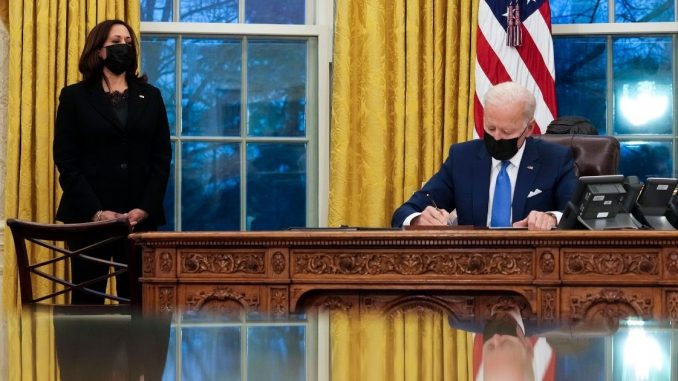
As the federal government in 1798 teetered dangerously close to what James Madison considered a vast misuse of its powers under the Constitution, he authored the Virginia Resolution.
The resolution affirmed that “in case of a deliberate, palpable, and dangerous exercise of other powers, not granted by the said compact, the states who are parties thereto, have the right, and are in duty bound, to interpose for arresting the progress of the evil, and for maintaining within their respective limits, the authorities, rights and liberties appertaining to them.”
More than 220 years later, North Dakota legislators — alarmed by the deluge of executive decrees from the Biden White House — are considering legislation to push back against the flood.
House Bill 1282, introduced recently by Republican state Rep. Sebastian Ertelt, creates what legislators are calling a committee on nullification.
“Upon receipt of federal legislation, regulation, or an executive order, for consideration and process, the committee shall recommend whether to nullify in its entirety a specific federal law, regulation, or executive order. In making its recommendation, the committee shall consider whether the legislation, regulation, or executive order is outside the scope of the powers delegated to the federal government in the Constitution of the United States,” the bill reads.
“The committee may review all existing federal statutes, regulations, and executive orders enacted before the effective date of this section for the purpose of determining constitutionality and shall recommend whether to nullify in its entirety a specific federal statute, regulation, or executive order,” the bill said.
If passed, the State Legislature ostensibly would decide if the edict becomes the law in North Dakota.
“If the legislative assembly approves the concurrent resolution by a simple majority to nullify a federal statute, regulation, or executive order based on constitutionality, the state and the citizens of the state may not recognize or be obligated to abide by the federal law or executive order,” the bill reads.
A companion piece of legislation, House Bill 1164, takes aims at presidential executive orders.
“The legislative management may review any executive order issued by the president of the United States which has not been affirmed by a vote of the Congress of the United States and signed into law as prescribed by the Constitution of the United States and recommend to the attorney general and the governor that the executive order be further reviewed,” the bill said.
“Upon recommendation from the legislative management, the attorney general shall review the executive order to determine the constitutionality of the order and whether the state should seek an exemption from the application of the order or seek to have the order declared to be an unconstitutional exercise of legislative authority by the president,” the bill reads.
Republican state Rep. Matthew Ruby, one of the sponsors of the bill, said ruling by executive order is a disease that must be cured.
“I would’ve supported it whether it was Trump or Bush or Obama — any of them. I really think there’s a huge difference between going through Congress and getting something passed compared to, you didn’t get your way so you’re putting it in as an executive order,” he said, according to KXNET.com.
In commenting on the bills, Daniel Horowitz wrote in The Blaze that “the Biden regime continues to rule by executive fiat, often promulgating unconstitutional orders infringing upon civil rights.”
He characterized the legislation as “the key to thwarting a wholesale slide into national despotism and ensuring that there are some places for Americans to go and enjoy the blessings of liberty. “
“The question is whether leaders in those legislative chambers as well as Gov. Doug Burgum will pick up the mantle, not to mention Republicans in other states,” Horowitz wrote.
